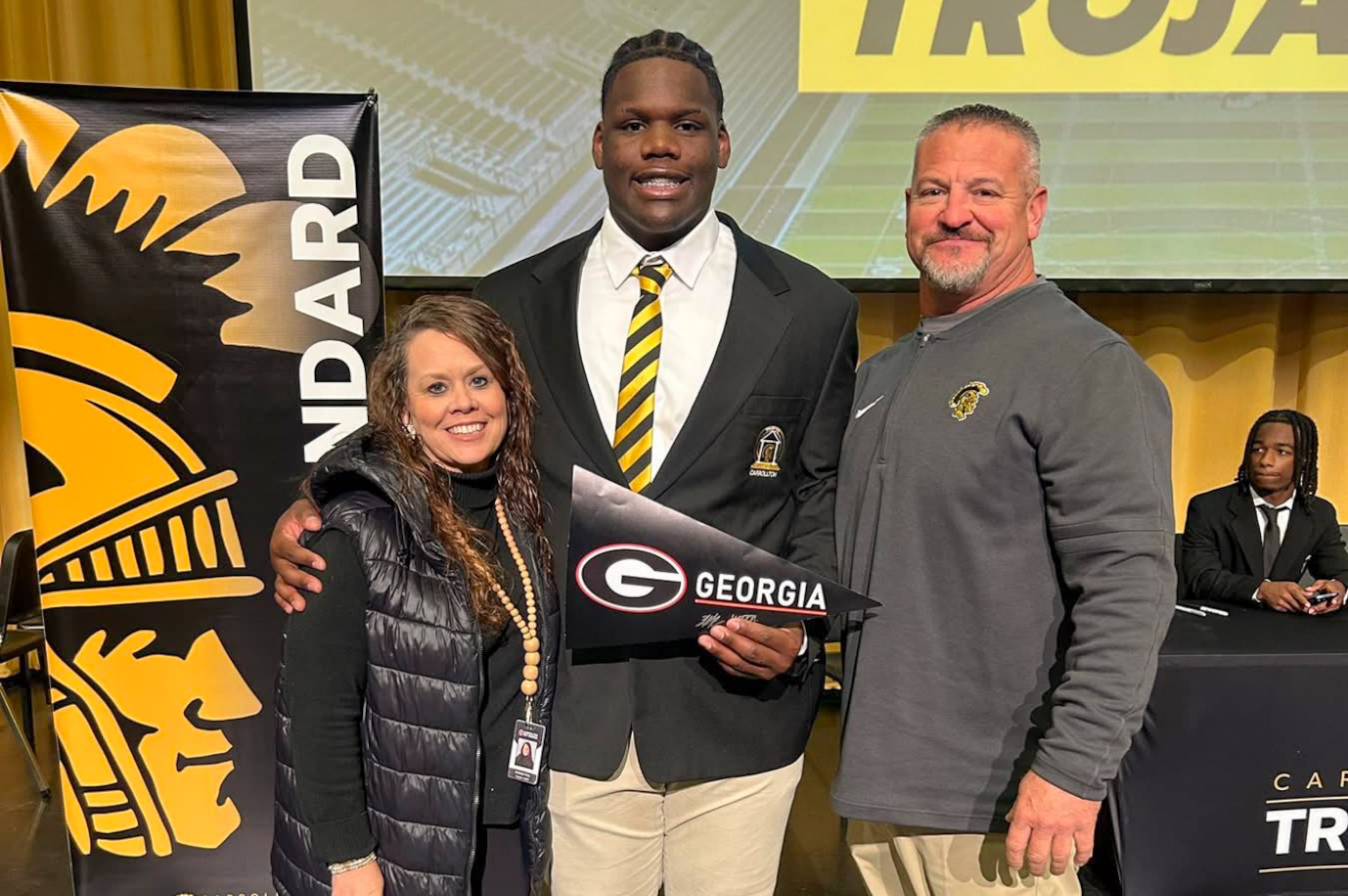No. 1 Georgia overwhelming opponents with tight ends
ATHENS — Sunday was National Tight Ends Day. Well, at least Georgia tight ends coach Todd Hartley says it was.
Never one to miss out on a chance to have some fun, Hartley decided to go all in on the notion that the Bulldogs feature the best collection of tight ends in the country. So, the UGA assistant coach declared it “National Tight Ends Day” in Athens. They printed T-shirts, fashioned a trophy of sorts, took pictures, put together a highlight video and everything. Then it was all sent out on Georgia football’s social media accounts.
While that gesture was mainly a recruiting ploy, it’s hard to argue with Hartley’s premise. Georgia’s tight ends can make a pretty good case for not only being the best of their position group nationally but also one of the best collections of talent at any position group. Just ask Florida, which will try to defend the Bulldogs’ contingent with one of the SEC’s most suspect pass defenses Saturday in Jacksonville, Fla.
Brock Bowers and Darnell Washington are the two headliners, snatching catches and tossing around defenders like rag dolls in the blocking game each week. Meanwhile, former five-star recruits Arik Gilbert and Oscar Delp have been getting in on the act lately. Each has hauled in his first career touchdown catch as Bulldogs in recent weeks, while Ryland Goede and Brett Seither continue to make regular appearances.
In total, it has added up to 49 catches for 760 yards and four touchdowns for tight ends in the passing game. More important, it has meant a lot of tight end involvement in multiple forms on Georgia’s offense, whether it be as blockers or runners.
“Well, first of all, it mellows out a defense because it tells them that you could run the ball, so they’re going to blitz a little bit less,” quarterback Stetson Bennett said of Georgia’s heavy use of tight ends. “You know, (defenses) probably have a little bit more of a bland game plan in ‘12′ personnel, if you have two tight ends. And then if they go in their nickel package and you can run the ball, and you’ve got a weight advantage. And when you’ve got guys who are as big as these guys are and can move, then what are you going to do? Are you going to put a smaller guy on them to move with them, or you can put a bigger guy on them who may not be able to move with them?
“They just create mismatches, and when you play clean football, I think we’ve got some of the best.”
There is little arguing that.
While the 6-foot-4, 235-pound Bowers was the story for the Bulldogs as a freshman last year, it has been the 6-7, 280-pound Washington who has been consistently drawing the oohs-and-aahs this season. He did so in the Bulldogs’ 49-3 season-opening win over No. 8 Oregon with a highlight-producing hurdle of a defender. The junior from Las Vegas – who has since leaped over two other defenders – made the highlight reel again with a pair of one-handed grabs in Georgia’s last outing against Vanderbilt.
Oddly, Washington has yet to score a touchdown for the Bulldogs this season. But he’s coming off a career-best 78 yards receiving on four catches in the last game and has 16 catches for 285 yards this season, which nearly matches the receiving production Washington had for his entire career coming into this year (16-311-1).
While Washington was utilized primarily as a blocker in previous seasons, Bennett is increasingly targeting “Big O” in the passing game. Why?
“Because he usually comes down with them,” Bennett cracked. “It’s like throwing into the Pacific Ocean.”
Targeting Washington more has, of course, meant targeting Bowers less. But the growing narrative that Bowers is having a less productive season than he did as a freshman last season really doesn’t have a lot of merit.
Through seven games last season, Bowers had 25 catches for 416 yards. Through the same number of games this season, Bowers sits at 26 receptions for 393 yards.
The chief difference is in the number of touchdowns. Bowers had seven at this point last season, six on receptions and one via a rush. This year, Bowers has five touchdowns, two via the pass and three on runs averaging 27.3 yards. He took the first handoff of the game 75 yards for a score against Kent State on Sept. 24. He also has a 78-yard TD reception, making him the only player in the country this year with a scoring catch and run of more than 75 yards.
Accordingly, Bowers tilted his head a little sideways when asked last week if there was any concern about his offensive production being down a bit this season.
“Shoot, I mean, there’s really not too much of a difference,” Bowers said with an inquisitive look. “We’re just trying to score points. I think whoever we can get the ball in the hands to do that or however I can help to do that is fine. Scoring points wins games, and that’s our goal as an offense. I’m not really worried about myself.”
Ah, words after Smart’s own heart.
Truly, though, Georgia’s offense is operating at a productive and efficient pace. The Bulldogs rank No. 8 nationally and third in the SEC in scoring with a 41.7-point average. Coupled with a defense that’s giving up 9.1 points a game, that makes for an average margin of victory pushing 33 points.
So, to reiterate, there are no professional jealousies in the Bulldogs’ locker room. In fact, Georgia’s offense has proved to be quite the socialist republic. Between an almost season-long ankle injury to star split end A.D. Mitchell and increased diversity in the passing game to include the Bulldogs’ running backs, Bennett has completed passes to 21 different receivers this season. That’s already more than he had all of last season (20).
But there’s no question that tight ends have become a particularly effective weapon for the Bulldogs. Traditionally known as “RBU,” Georgia would have to call itself “TEU” to this point.
With Delp and Gilbert making strides recently, Smart was asked if the Bulldogs have given much consideration for utilizing more than “13″ personnel going forward. That’s the football term for one back and three tight ends. Currently, Georgia lines up almost exclusively in “12″ personnel, or one back and two tight ends.
“Thirteen gives you a chance to do some things, but sometimes having (multiple) similar bodies doesn’t cause enough problems for a defense,” Smart said with a scoff. “It sounds good. Everybody just likes it because it sounds good.”



